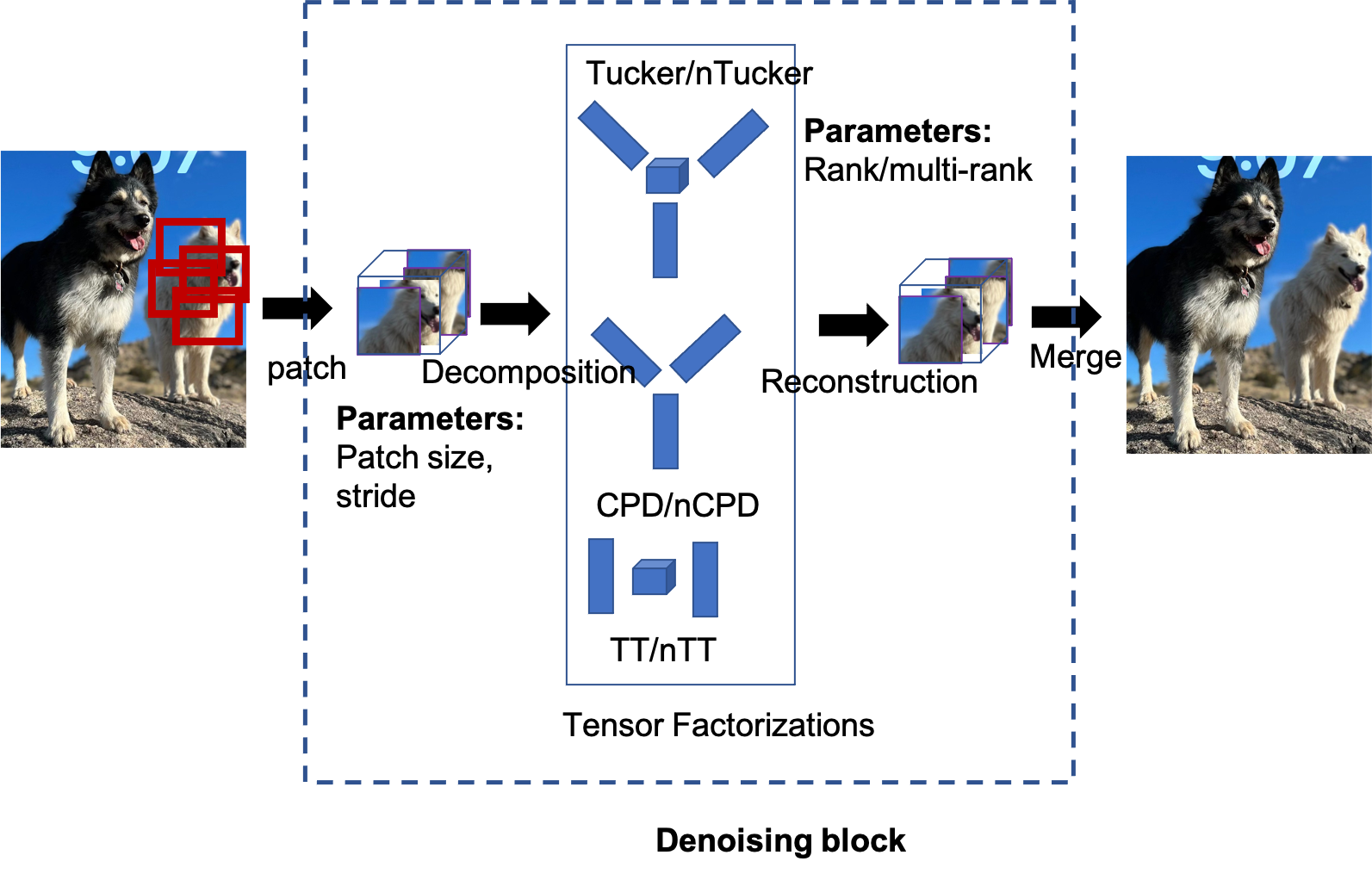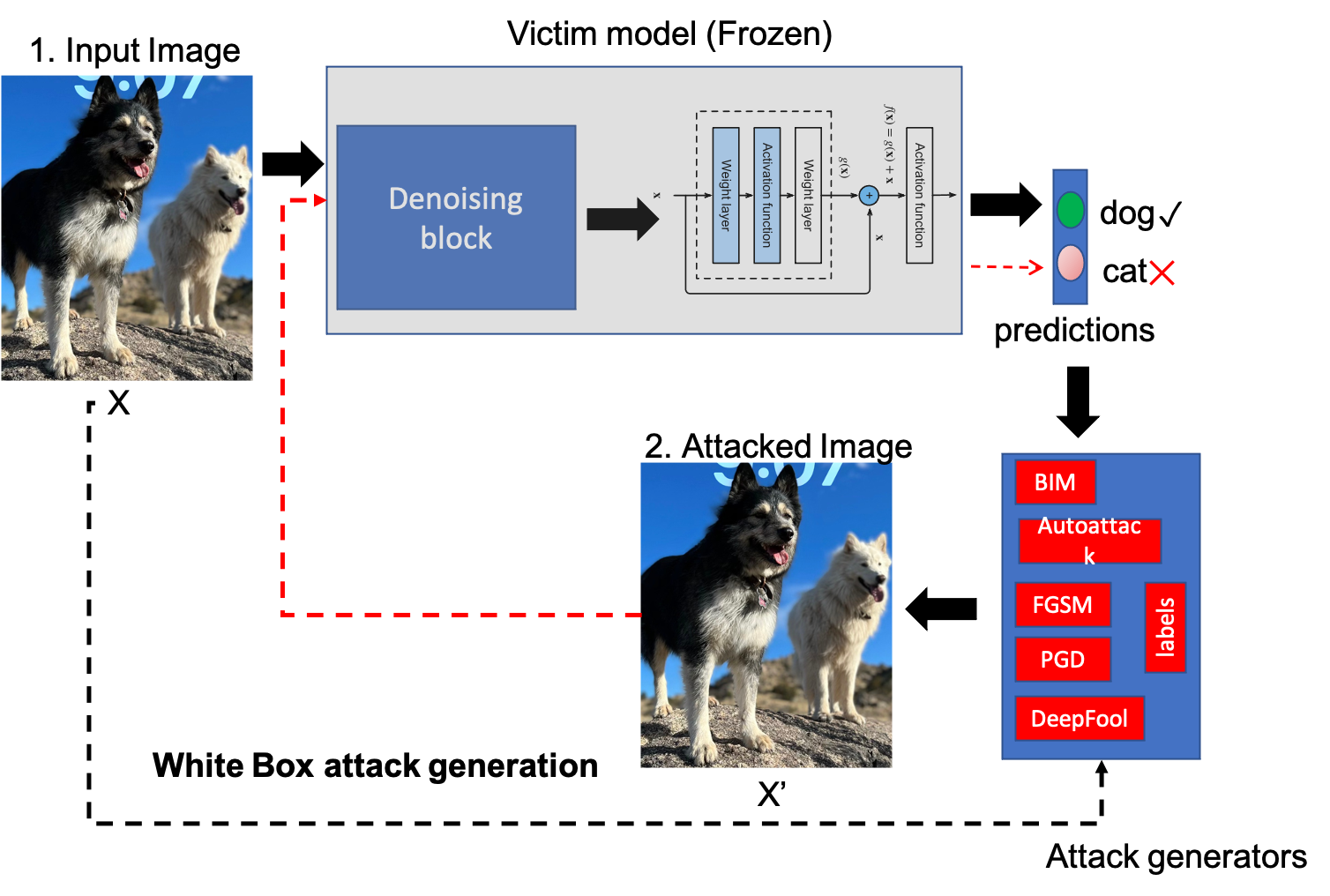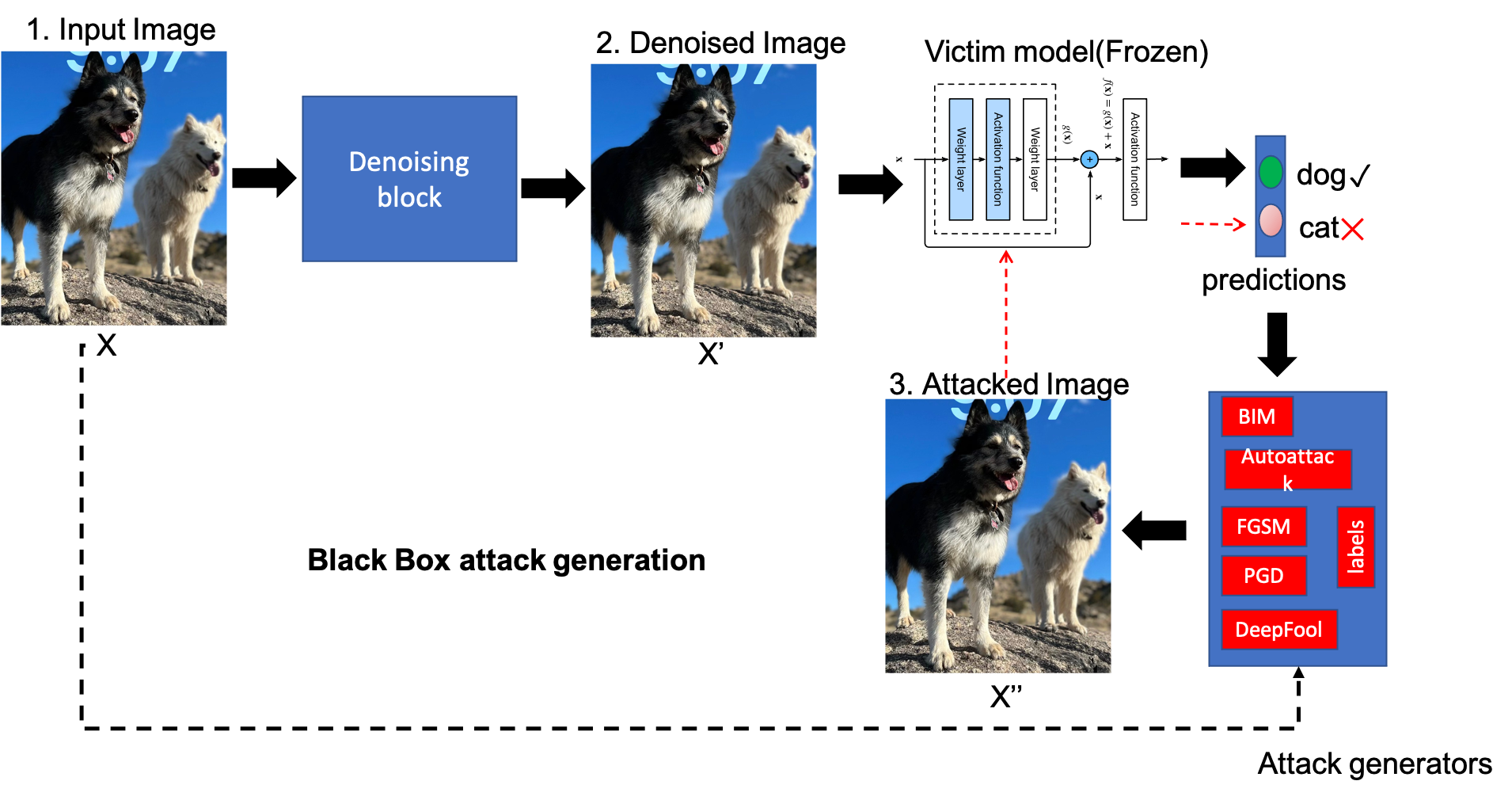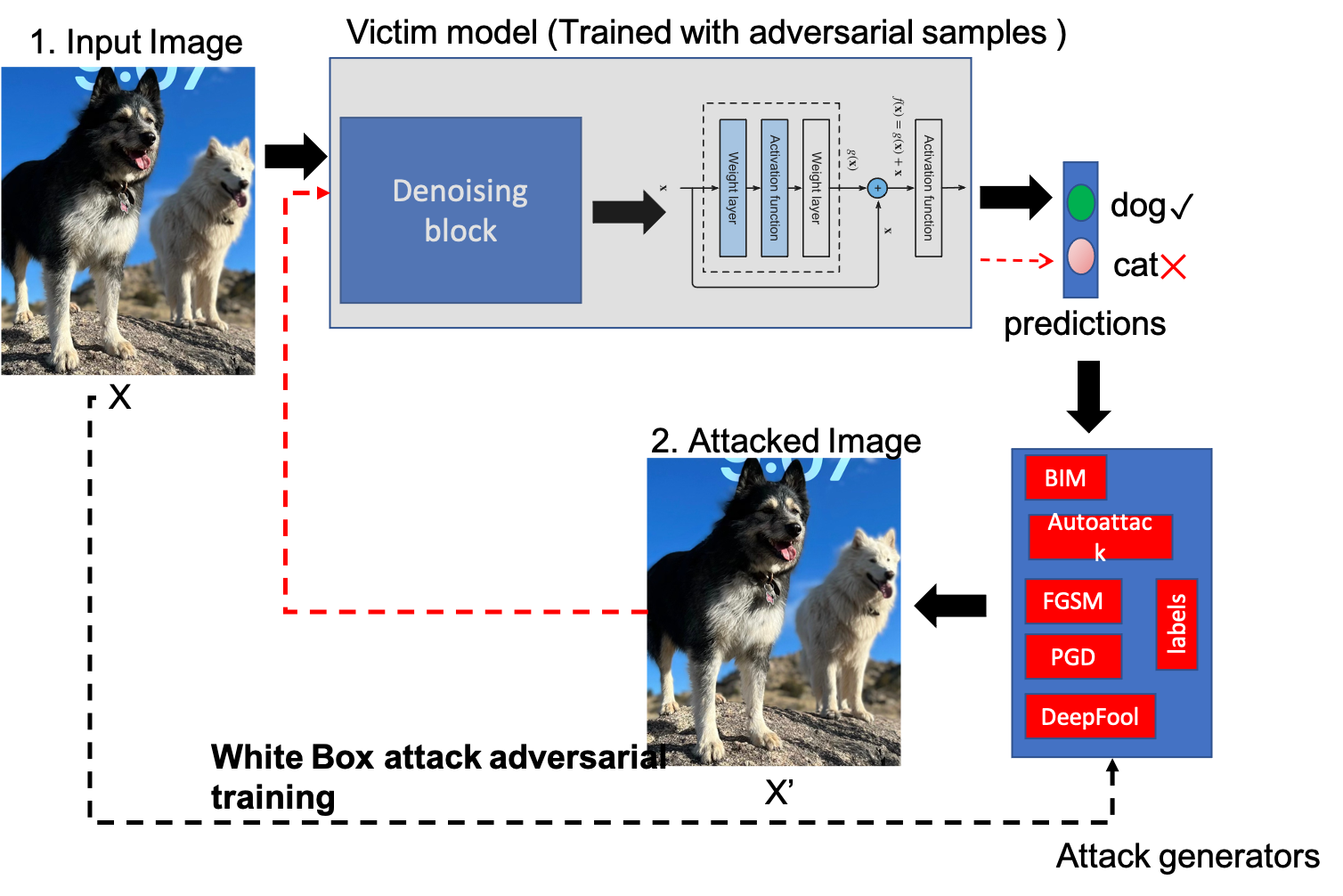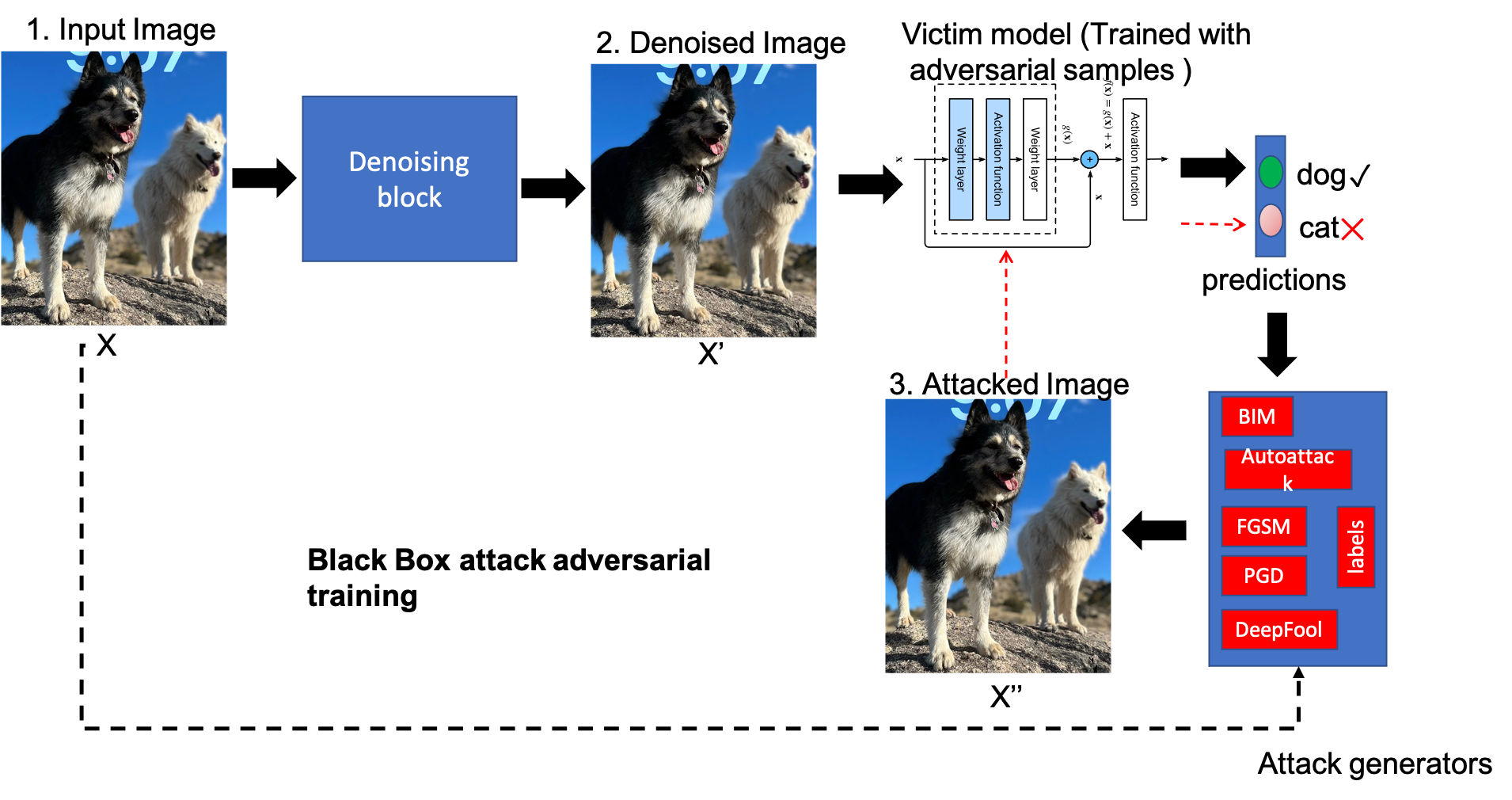This library implements a variety of tensor factorization methods for defending Artificeal intelligence (AI) models against adversarial attacks. The library implements three main operations. First, tensor factorization methods are implemented as a preprocessing stage for input data to AI models to reduce the effectiveness of adversarial noise. In the second operation, tensor factorization methods are used to find novel latent attack features by combining proposed attacks from a variety of methods. Since these attacks will inherently be a combination of attacks many algorithms against many models, they have the potential to threaten a wide variety of AI models simultanioulsy In the third operation, an unsupervised generative adversarial networks (GAN) is employed to generate denoised data from many adversarial noises. This generator provides robust defense against unseen attacks.
- Tensor factorizations with Tucker, non-negative Tucker, CPD, non-negative CPD, Tensor Train, NMF, NNSVD and NMF
- Ability to perform adversarial training.
- Works on Cifar10/Cifar100/Imagenet/Tiny-Imagenet/MNIST/Fashion-MNIST.
First, set the environment variables specific to your experiment in send_train_jobs.sh.
- Models will be stored in
my_checkpoints. For example:my_checkpoints/cifar10/resnet18_0_1.ckpt - If using CSVLogger, log data will be saved in
log_{dataset_name}_{model_name}_test/{fold_ind}_{nfolds}
bash send_train_jobs.shSet the environment variables for the experiment in send_attack_jobs.sh.
- Attack data and logs will be stored in
attack_log_{dataset_name}/{model_name}/{fold_ind}_{nfolds}_{attack_type}
bash send_attack_jobs.shSet the environment variables for the experiment in send_tune_jobs.sh.
- The tuning results will be located at
parameter_search_{dataset_name}/{model_name}/{fold_ind}_{nfolds}_{attack_type}/search_results
bash send_tune_jobs.shAfter setting the environment variables:
- The results will be stored as CSV files in
tune_csv_results
bash collect_results.sh- Set
final_test_settoTrueinsend_attack_jobs.sh
bash send_attack_jobs.sh- After setting specific environment variables (such as
eval_top_k):
bash send_final_eval_jobs.sh- Manish Bhattarai - Los Alamos National Laboratory
- Mehmet Kaymak Cagri - Los Alamos National Laboratory
- Ben Nebgen - Los Alamos National Laboratory
- Boian Alexandrov - Los Alamos National Laboratory
- Kim Rasmussen - Theoretical Division, Los Alamos National Laboratory
@article{bhattarai2023robust,
title={Robust Adversarial Defense by Tensor Factorization},
author={Bhattarai, Manish and Kaymak, Mehmet Cagri and Barron, Ryan and Nebgen, Ben and Rasmussen, Kim and Alexandrov, Boian},
journal={arXiv preprint arXiv:2309.01077},
year={2023}
}Los Alamos National Lab (LANL), T-1
© (or copyright) 2023. Triad National Security, LLC. All rights reserved. This program was produced under U.S. Government contract 89233218CNA000001 for Los Alamos National Laboratory (LANL), which is operated by Triad National Security, LLC for the U.S. Department of Energy/National Nuclear Security Administration. All rights in the program are reserved by Triad National Security, LLC, and the U.S. Department of Energy/National Nuclear Security Administration. The Government is granted for itself and others acting on its behalf a nonexclusive, paid-up, irrevocable worldwide license in this material to reproduce, prepare derivative works, distribute copies to the public, perform publicly and display publicly, and to permit others to do so.
This program is open source under the BSD-3 License. Redistribution and use in source and binary forms, with or without modification, are permitted provided that the following conditions are met:
-
Redistributions of source code must retain the above copyright notice, this list of conditions and the following disclaimer.
-
Redistributions in binary form must reproduce the above copyright notice, this list of conditions and the following disclaimer in the documentation and/or other materials provided with the distribution.
-
Neither the name of the copyright holder nor the names of its contributors may be used to endorse or promote products derived from this software without specific prior written permission.
THIS SOFTWARE IS PROVIDED BY THE COPYRIGHT HOLDERS AND CONTRIBUTORS "AS IS" AND ANY EXPRESS OR IMPLIED WARRANTIES, INCLUDING, BUT NOT LIMITED TO, THE IMPLIED WARRANTIES OF MERCHANTABILITY AND FITNESS FOR A PARTICULAR PURPOSE ARE DISCLAIMED. IN NO EVENT SHALL THE COPYRIGHT HOLDER OR CONTRIBUTORS BE LIABLE FOR ANY DIRECT, INDIRECT, INCIDENTAL, SPECIAL, EXEMPLARY, OR CONSEQUENTIAL DAMAGES (INCLUDING, BUT NOT LIMITED TO, PROCUREMENT OF SUBSTITUTE GOODS OR SERVICES; LOSS OF USE, DATA, OR PROFITS; OR BUSINESS INTERRUPTION) HOWEVER CAUSED AND ON ANY THEORY OF LIABILITY, WHETHER IN CONTRACT, STRICT LIABILITY, OR TORT (INCLUDING NEGLIGENCE OR OTHERWISE) ARISING IN ANY WAY OUT OF THE USE OF THIS SOFTWARE, EVEN IF ADVISED OF THE POSSIBILITY OF SUCH DAMAGE.
